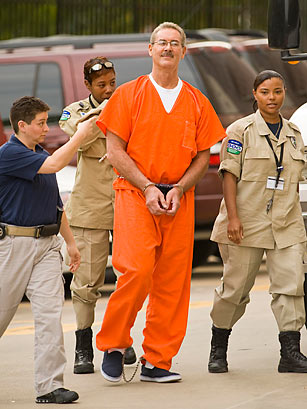
His philanthropic ways earned him the title "Sir Allen" in Antigua, but to tens of thousands of people elsewhere, Allen Stanford is just a plain criminal. On Mar. 6, Stanford was found guilty of running a massive Ponzi scheme that bilked some 30,000 investors out of more than $7 billion. He was convicted on 13 out of 14 counts, including fraud and conspiracy, confirming to his one-time clients that their investments were simply padding Stanford's pockets. Stanford, 61, lived a luxe life between the Caribbean and southern U.S., filled with mansions, yachts and even a cricket pitch in Antigua. His personal net worth totaled $2.2 billion at its peak. The Texas mogul became one of the nation's richest men through his self-made financial firm based in both Houston and Antigua. But in February 2009, Stanford's lavish lifestyle came crashing down when the Securities and Exchange Commission accused him of defrauding his investors. The feds swooped in to seize his empire, alleging that Stanford's investment portfolios, with billions of dollars in their coffers, promised "improbable, if not impossible" returns. In their indictment, the SEC noted that Stanford's funds engaged in fraud of "shocking magnitude," showing investors massive returns and then engineering financial statements to "report investment income that the bank did not actually earn." The investors that were swindled out of their life savings waited three years for Stanford to meet justice. The former billionaire's attorneys claimed he suffered amnesia during a 2009 prison injury, but after undergoing a psychological evaluation, he was deemed fit for the trial, which began in January. Stanford proclaimed his innocence every step of the way, culminating in a rambling 40-minute statement at his sentencing hearing on June 14, when he was sentenced to 110 years in prison.